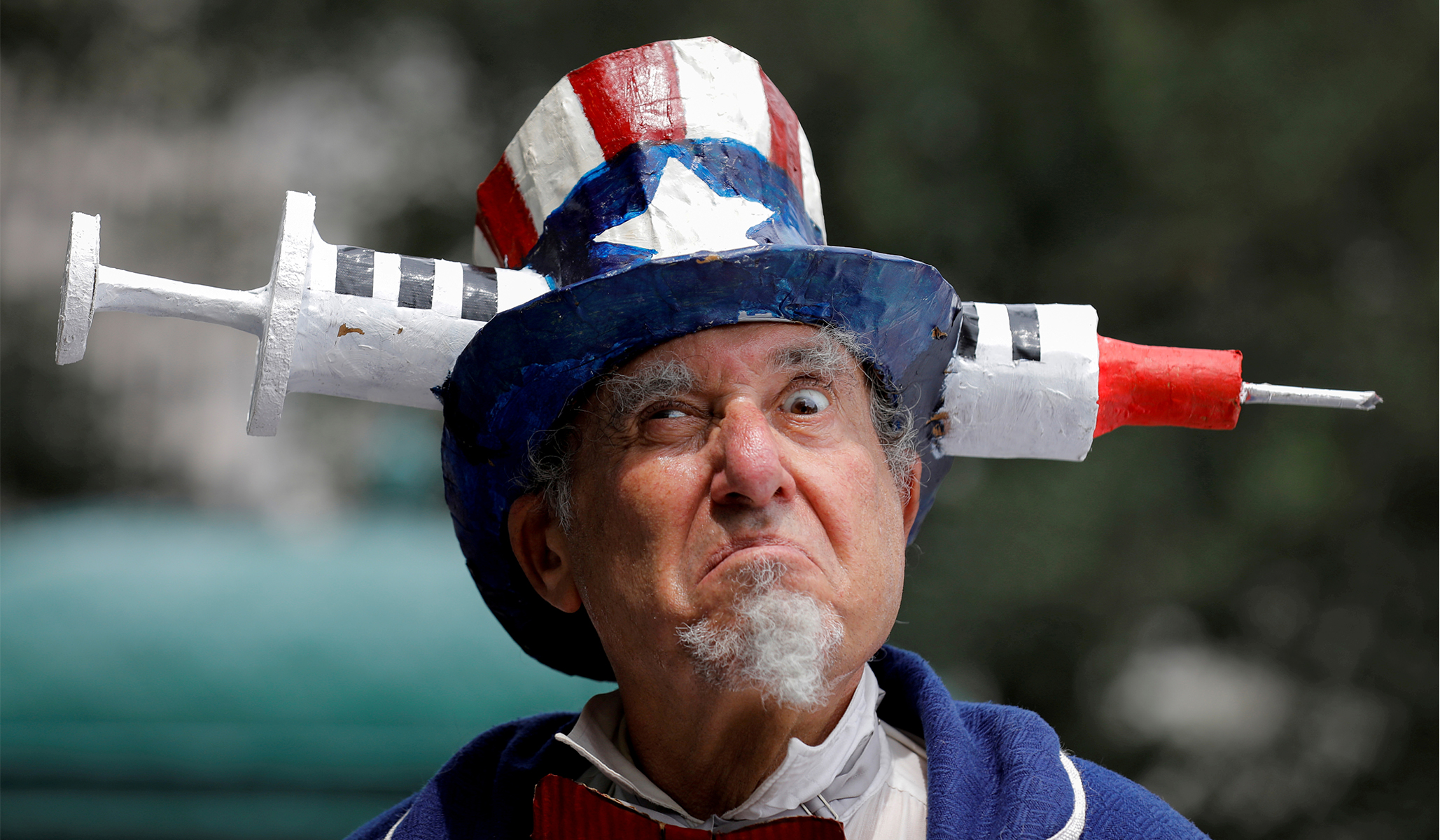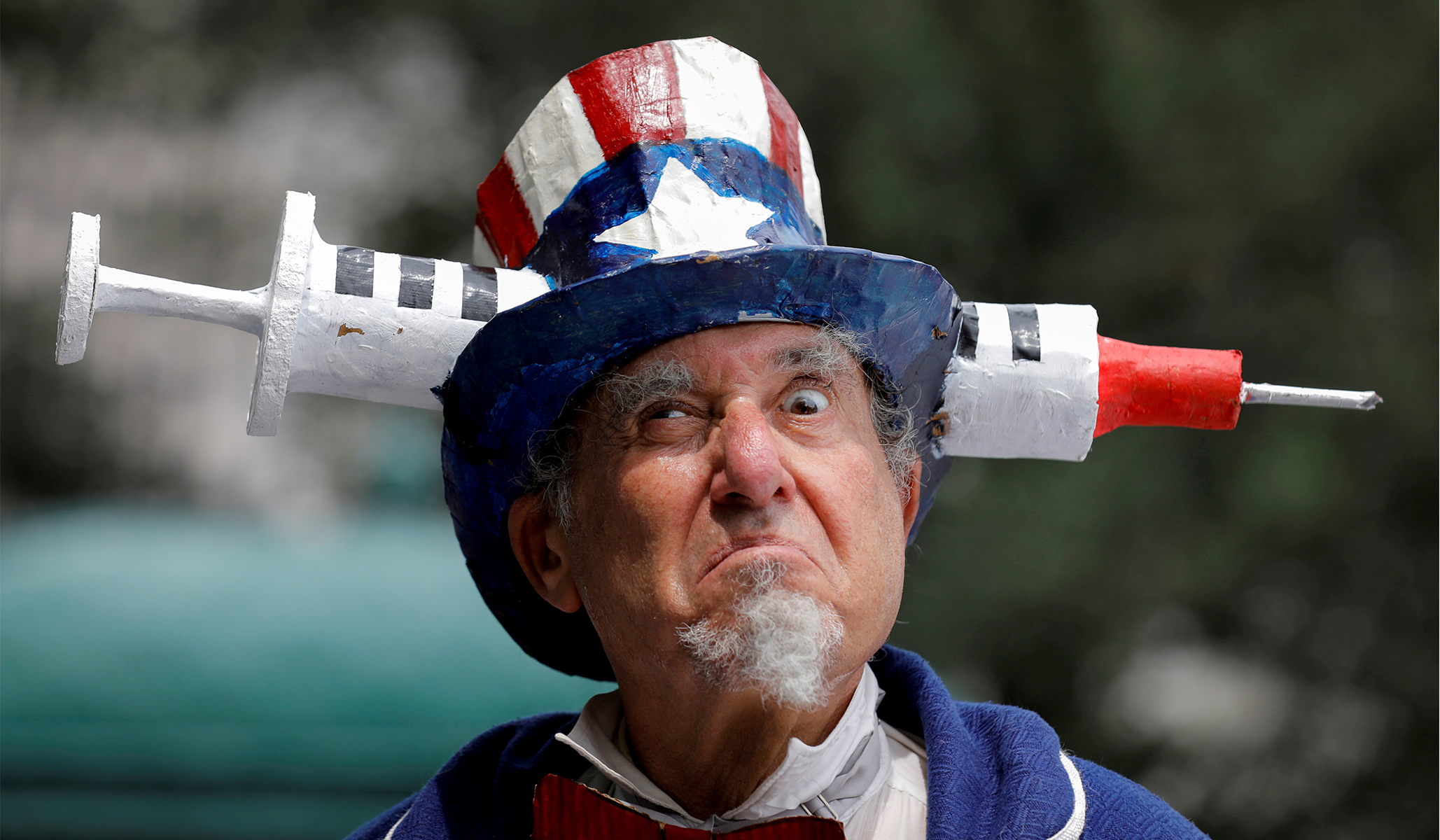
(Andrew Kelly/Reuters)
‘Tax the Unvaxxed,” writes Anne Kim in the Washington Monthly, arguing that “people who refuse the COVID vaccine are imposing costs on society. Time to make them pay.” Kim proposes a variety of privately imposed surcharges (not taxes) — for instance, restaurants and airlines could impose charges on unvaccinated customers and high-school wrestling teams on unvaxxed participants.
Kim is slightly concerned about “low-income Americans, who have borne the brunt of the pandemic,” but asserts that none of these fees would disproportionately affect the poor, who are known not to eat out, fly, or join high-school sports teams. She also draws a distinction between those who are vaccine-hesitant because they are “justifiably mistrustful of government” (blacks) and those whose mistrust of government is unjustifiable (conservatives), but doesn’t offer a solution to this problem. (Maybe waive all COVID surcharges for black people? It’s a thought.)
The progressive celebrity economist Justin Wolfers is thinking along the same lines: “When anti-vaxxers rack up tens of thousands of dollars in hospital bills, who pays?” he asked in a tweet. “Think about it, and you’ll realize that their political positions are effectively being subsidized by members of insurance pools, taxpayers, and the vaccinated.” He added in another tweet, “When they hurt themselves, we pay.”
I get what Wolfers and Kim are saying. You are being incredibly irresponsible to your fellow citizens when you refuse the vaccine because that decision results in externalities — costs borne by others. You may be taking up a precious hospital bed or using up other medical resources. The medical expenses you rack up from a bad case of COVID mean higher insurance bills down the line for everyone else. Let’s take their argument to its logical end and call vaccine resistance what it is: a grotesque moral failure or character flaw.
Kim and Wolfers are engaging in bold new thinking: We’ve gotten used to sin taxes on goods such as alcohol, tobacco, and Pepsi, but what we haven’t done much of is tax behavior, or in this case nonbehavior — failure to do something that’s obviously wise.
But why stop there? If the principle is “we must tax inaction that results in external costs,” why is this the only case to which the principle should apply?
COVID is a crisis that must not be allowed to go to waste. We can make a better, healthier society using the taxing power. So let’s think big. As big as Ian Millhiser, a senior correspondent for the young-adult site Vox, who states in a tweet: “Congress should increase the income tax rate on taxpayers who are unvaccinated, and who have no legitimate religious or medical reason to be unvaccinated, to 99 percent. This could be done through reconciliation.” A 99 percent tax on a moral failing that imposes externalities? This is an absolutely wonderful idea, so let’s keep going.
Tax the couch potatoes. Exercise is a proven good, and anyone who fails to exercise is imposing costs on society by making himself more likely to succumb to disease and take up hospital beds and drive up everyone else’s insurance costs down the line. How will we know that people haven’t been exercising? Let’s keep it simple: Everyone has to do ten pushups at the gate for United Airlines. Can’t manage it? You have to pay 50 bucks.
Tax the fat. The other day Wolfers retweeted a person who said, “I’m overweight and I agree I should be shamed. I’m on my way to diabetes as I get older.” Shame isn’t enough, though. If we should tax people for passively failing to do a good thing like get vaccinated, surely we are even more justified in taxing people for actively choosing to do a bad thing such as eat unhealthily. Obesity is the leading risk factor for type 2 diabetes, so let’s go to work on that. Restaurant hosts and hostesses shall be required — this can be done through reconciliation, via a 99 percent tax on eateries that fail to comply — to measure every incoming customer’s waist and hips with a tape measure. Obese persons shall be charged an extra 20 percent, and also forced to order a salad. (And not the tasty kind! No bacon bits or ranch dressing!) As part of the program to punish obese people for taking up hospital beds and imposing costs on society, all who receive food stamps must prove each year that their body-mass index is below 30. I can hear Kim and Millhiser protesting: Wait a minute, that isn’t even a tax on people who impose costs on society, it’s simply withdrawal of a subsidy. I agree this is a problem. A simple solution presents itself: All doctors will be federally required to report obese patients to the IRS so that an appropriate federal fat surcharge can be imposed on them. Bonus: This will instantly pay our infrastructure costs for a very long time!
Tax the lazy. All able-bodied persons who choose not to work impose direct costs on society by taking various kinds of welfare payments. All of these should be withdrawn, but since the long-term unemployed are more likely to get sick, and drive up everyone else’s insurance costs down the line, they should also have to pay an idleness tax.
Two corollary proposals:
Tax single moms. Children, especially boys, who grow up in single-parent households impose stark costs on society in the form of much higher rates of crime, which raises everyone else’s tax bills down the line because of the massive expense of the criminal-justice system. And yet we subsidize single moms through the welfare system. Madness. Zero out all such subsidies and replace them with a Murphy Brown tax. Our goal should be to reduce single motherhood back to where it was in the 1940s.
Subsidize smoking. Smoking is the one vice that is notable for the savings it provides society. Smokers kill themselves off so quickly (they die ten years prematurely on average) that they save the federal government large sums in Social Security and Medicare. Kip Viscusi, an economist at Vanderbilt, estimated the benefit to the government at 32 cents per pack of cigarettes. Why would we tax a behavior that reduces costs on society? All cigarette taxes should be canceled immediately.
But even that wouldn’t be doing enough to show our gratitude for the benefits smokers bring to society. If there were a 25-cent federal subsidy for each pack of cigarettes sold, we’d still be seven cents to the good. With this bonus, and the nixing of all cigarette taxes, smokers would be able to indulge themselves for maybe a buck a pack. Smoking rates would skyrocket, and each new nicotine fiend created would bring additional savings to society.
Open your mind to the possibilities: Reopen the planes, the trains, the bars, and the restaurants to smokers, and launch a massive social-pressure campaign to encourage this habit, across generations. For the sake of the bottom line.

